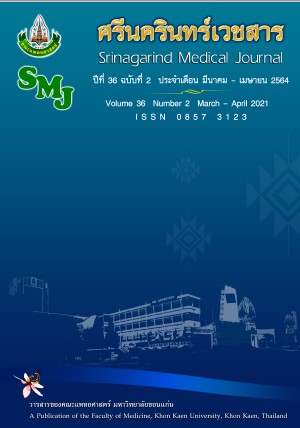ประสิทธิผลของกิจกรรมพัฒนาศักยภาพผู้สูงอายุเพื่อส่งเสริมพฤติกรรมสุขภาพของผู้สูงอายุในบ้านโนนเค็ง ตำบลคำขวาง อำเภอวารินชำราบ จังหวัดอุบลราชธานี
Abstract
หลักการและวัตถุประสงค์: กิจกรรมการส่งเสริมสุขภาพทั้ง 6 ด้าน ได้แก่ 1) ความรับผิดชอบต่อสุขภาพ 2) กิจกรรมทางกาย 3) จิตวิญญาณ 4) การมีปฏิสัมพันธ์ระหว่างบุคคล 5) การจัดการกับความเครียด 6) โภชนาการ รวมถึงการส่งเสริมสุขภาพจิต สามารถส่งผลต่อภาวะสุขภาพที่ดีของผู้สูงอายุได้ วัตถุประสงค์เพื่อศึกษาประสิทธิผลของกิจกรรมพัฒนาศักยภาพเพื่อส่งเสริมพฤติกรรมสุขภาพของผู้สูงอายุ บ้านโนนเค็ง ต.คำขวาง อ.วารินชำราบ จ.อุบลราชธานี โดยเปรียบเทียบ คะแนนพฤติกรรมสุขภาพ และสุขภาพจิตของผู้สูงอายุระหว่างก่อนและหลังเข้าร่วมกิจกรรม
วิธีการศึกษา: เป็นการศึกษากึ่งทดลอง กลุ่มตัวอย่างที่ศึกษาคือผู้สูงอายุ จำนวน 37 ราย สุ่มตัวอย่างแบบเจาะจง จัดกิจกรรมพัฒนาศักยภาพ 4 ครั้ง เช่น การให้ความรู้ในการดูแลตนเอง การออกกำลังกาย การทำสมาธิ การประกวดผู้สูงอายุสุขภาพดี และฝึกทำอาหารเพื่อสุขภาพ เก็บข้อมูลโดยใช้แบบสัมภาษณ์พฤติกรรมสุขภาพ (ค่าสัมประสิทธิ์แอลฟาครอนบาค = 0.79 ) และแบบประเมินสุขภาพจิตของผู้สูงอายุ (T-GMHA-15) วิเคราะห์ข้อมูลโดยใช้ ค่าร้อยละ ค่าเฉลี่ย ส่วนเบี่ยงเบนมาตรฐาน และ Paired sample t-test ที่ระดับนัยสำคัญทางสถิติ 0.05 ในการเปรียบเทียบความแตกต่างของคะแนนพฤติกรรมสุขภาพและคะแนนสุขภาพจิต ระหว่างก่อนและหลังเข้าร่วมกิจกรรม
ผลการศึกษา: ภายหลังเข้าร่วมกิจกรรม ค่าเฉลี่ยคะแนนพฤติกรรมสุขภาพ และคะแนนสุขภาพจิต ของผู้สูงอายุเพิ่มขึ้นอย่างมีนัยสำคัญทางสถิติ (p <0.001) โดยก่อนเข้าร่วมกิจกรรมผู้สูงอายุมีพฤติกรรมด้านการมีปฏิสัมพันธ์ระหว่างบุคคลมีค่าคะแนนเฉลี่ยสูงสุด 26.38 (±3.96) พฤติกรรมสุขภาพรายข้อที่มีค่าคะแนนเฉลี่ยมากที่สุด คือ การรับประทานอาหารครบ 3 มื้อ ใน 1 และหลังการเข้าร่วมกิจกรรม ค่าเฉลี่ยคะแนนพฤติกรรมสุขภาพทุกด้านเพิ่มขึ้นอย่างมีนัยสำคัญทางสถิติ ก่อนเข้าร่วมกิจกรรมผู้สูงอายุ มีภาวะสุขภาพจิตเท่ากับคนทั่วไป ร้อยละ 56.8 และภายหลังการจัดกิจกรรม พบว่า ผู้สูงอายุมีความพึงพอใจต่อการจัดกิจกรรมอยู่ในระดับมากที่สุด
สรุป: กิจกรรมพัฒนาศักยภาพผู้สูงอายุมีประสิทธิผลต่อการพัฒนาพฤติกรรมสุขภาพและสุขภาพจิตของผู้สูงอายุ ดังนั้นควรมีการจัดกิจกรรมให้แก่ผู้สูงอายุอย่างต่อเนื่องและกิจกรรมนี้สามารถนำไปประยุกต์
ใช้กับผู้สูงอายุในพื้นที่อื่นๆ เพื่อยกระดับพฤติกรรมสุขภาพของผู้สูงอายุให้ดียิ่งขึ้น
คำสำคัญ: กิจกรรมพัฒนาศักยภาพผู้สูงอายุ; พฤติกรรมสุขภาพ; ผู้สูงอายุ
Background and Objective: Organizing activities in promoting health in 6 aspects as follow: 1) Health responsibility 2) Physical activity 3) Spiritual growth 4) Interpersonal relations 5) Stress management and 6) Nutrition and promoting mental health including good health behaviors could affect the good health of the elderly. This study aimed to determine the effectiveness of elderly capacity and development activities for promoting health behaviors among elderly in Ban Nonkheng vilage, Khumkwang sub-district, Warin Chamrap district, Ubon Ratchathani province.
Method: The study was quasi-experimental research. Total of 37 elderly were recruited by the purposive sampling. The study contained 4 activities, such as educating about self -care, physical activity, meditation, healthy elderly contests, healthy food cooking practice. Data were collected by using an interview for health behaviors (Cronbach’s coefficient =0.79) and Thai geriatric mental health assessment tool. Data analysis, descriptive statistics were used such as percentage, mean and standard deviation. Paired t-tests was used at the statistical significance level of 0.05 to compare the difference in health behaviors score and mental health score before- and after participating in the activity.
Results: Results revealed that after joined the activities, health behaviors and mental health mean scores of the elderly statistically significantly increased compared to those before joined the activities (p <0.001). Before participating in the activity the elderly had Interpersonal relations with the highest mean score of 26.38 (±3.96), the health behaviors with the highest average scores was eating 3 meals in 1 day and after participating in activities, mean health behavior scores were significantly increase in all aspects. Before participating, the elderly had mental health condition equal to 58.6% of the general population. After the activities, it was found that the elderly had the highest level of satisfaction.
Conclusion: The findings indicated that the elderly capacity development activities had the effectiveness to increase health behaviors and mental health in the elderly. Therefore the activities should be provided continually to the elderly and the activities also could be applied to elderly in other areas in order to enhance better health behaviors.
Keywords: Elderly capacity development activity; health behaviors; elderly


